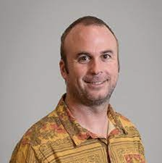Phill Cassey
 Speaker: Phill Cassey, Head of the Department of Ecology & Evolutionary Biology, and the Invasion Science and Wildlife Ecology Group, University of Adelaide
Speaker: Phill Cassey, Head of the Department of Ecology & Evolutionary Biology, and the Invasion Science and Wildlife Ecology Group, University of Adelaide
Presentation: Final reflections
Bio: is Head of the Department of Ecology and Evolutionary Biology, at the University of Adelaide. He has studied environmental biosecurity and wildlife conservation for 20+ years and is globally recognized for his research in invasion ecology and illegal wildlife trade.He has published over 300 international scientific research papers and is a vocal advocate for equity and inclusivity in scientific research and training practices. Phill is an Academic member of the AELERT and INTERPOL Wildlife Crime Working Groups, and in 2019, he was nominated by the Australian Government (Department of Agriculture, Water and Environment) to represent Australia as a lead author on the UN Intergovernmental Science-Policy Platform on Biodiversity and Ecosystem Services (IPBES) ‘Global Biodiversity Assessment Report.’